Applying Qualitative Analysis to Entrepreneurial Self-Efficacy
VerifiedAdded on 2023/06/10
|7
|1504
|140
Case Study
AI Summary
This case study employs a qualitative analysis to explore the concept of entrepreneurial self-efficacy, focusing on its antecedents. The study utilizes an unstructured qualitative interview approach with thematic analysis to investigate factors influencing entrepreneurial self-efficacy at both individual and firm levels. Three key themes are examined through interview questions: the understanding of entrepreneurial self-efficacy antecedents, the factors related to individual-level antecedents, and the factors associated with firm and macro-level antecedents. The findings reveal that participants possess a basic understanding of these concepts. The reflection highlights challenges encountered during the interview process, such as participants' limited knowledge and the time-consuming nature of the analytical approach. The case study concludes by acknowledging the limitations of the chosen survey strategy and analytical approach, while emphasizing the average quality of the results. Desklib provides a platform to access similar case studies and solved assignments for students.
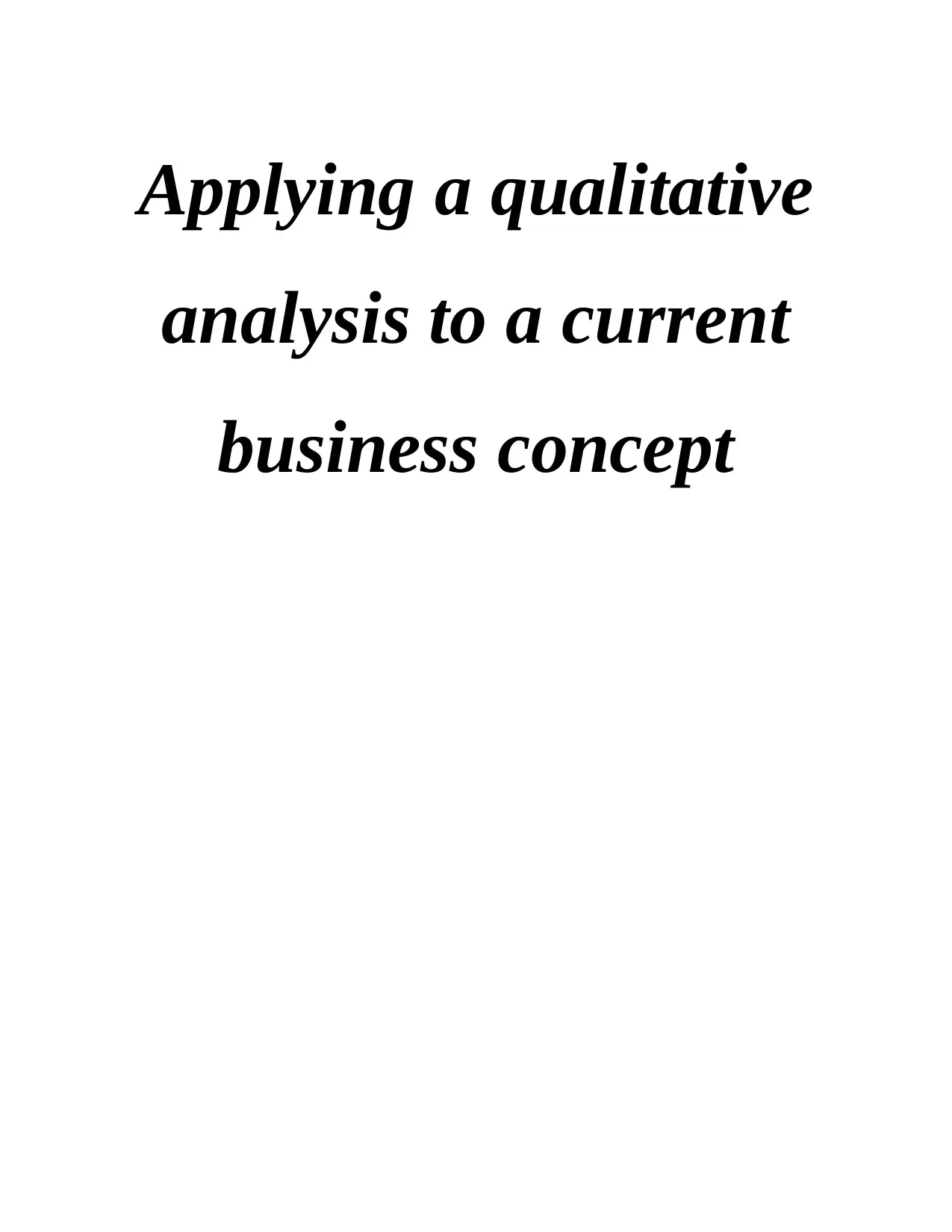
Applying a qualitative
analysis to a current
business concept
analysis to a current
business concept
Paraphrase This Document
Need a fresh take? Get an instant paraphrase of this document with our AI Paraphraser
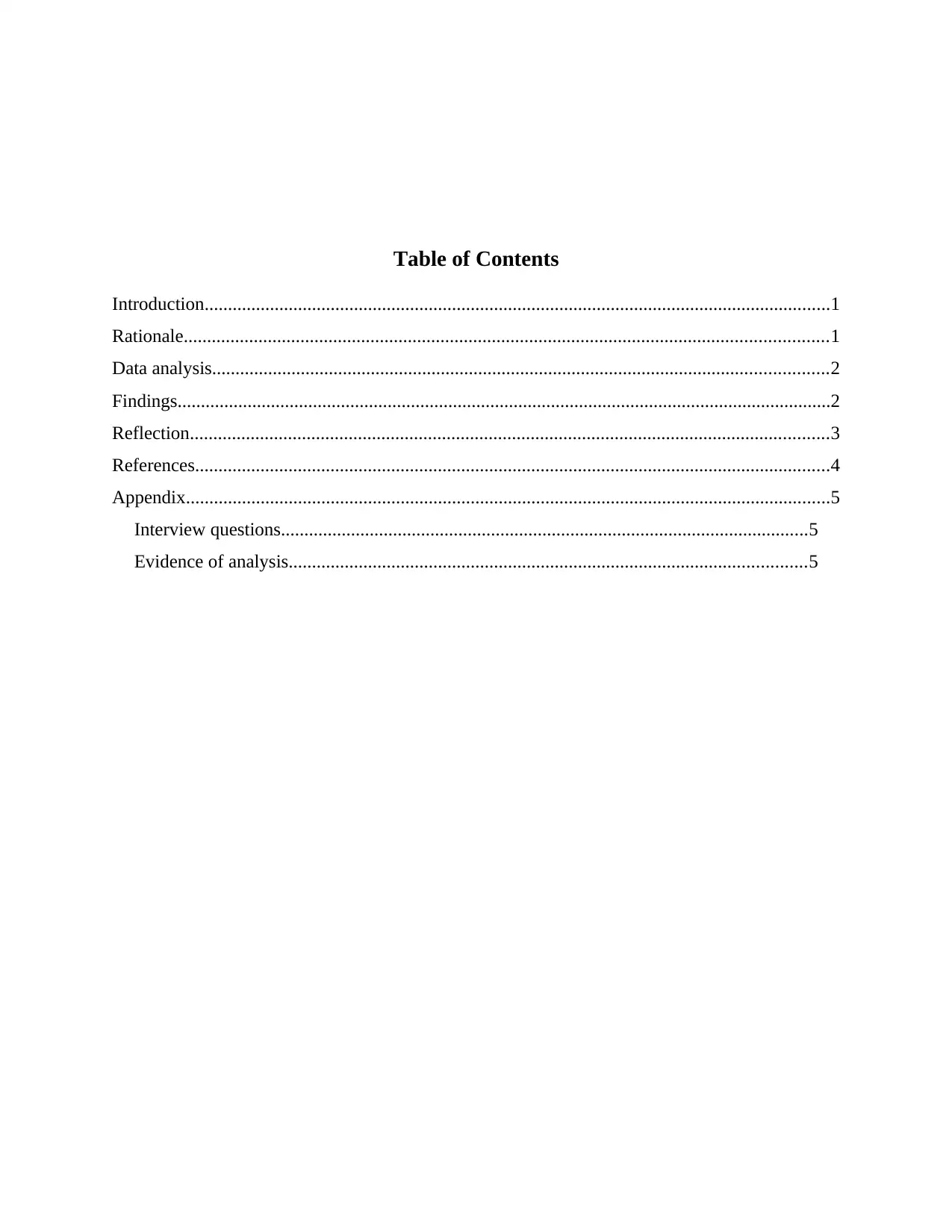
Table of Contents
Introduction......................................................................................................................................1
Rationale..........................................................................................................................................1
Data analysis....................................................................................................................................2
Findings............................................................................................................................................2
Reflection.........................................................................................................................................3
References........................................................................................................................................4
Appendix..........................................................................................................................................5
Interview questions.................................................................................................................5
Evidence of analysis...............................................................................................................5
Introduction......................................................................................................................................1
Rationale..........................................................................................................................................1
Data analysis....................................................................................................................................2
Findings............................................................................................................................................2
Reflection.........................................................................................................................................3
References........................................................................................................................................4
Appendix..........................................................................................................................................5
Interview questions.................................................................................................................5
Evidence of analysis...............................................................................................................5
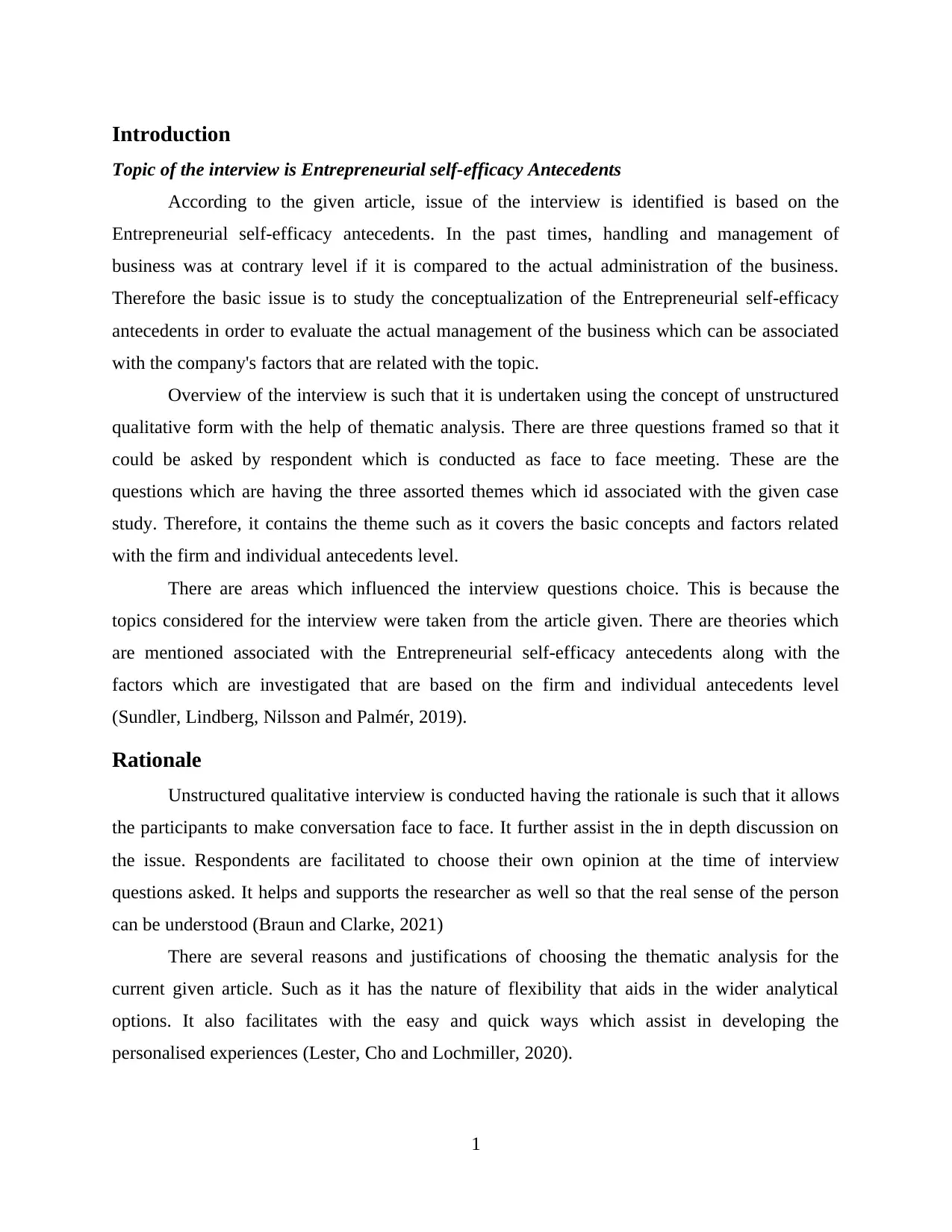
Introduction
Topic of the interview is Entrepreneurial self-efficacy Antecedents
According to the given article, issue of the interview is identified is based on the
Entrepreneurial self-efficacy antecedents. In the past times, handling and management of
business was at contrary level if it is compared to the actual administration of the business.
Therefore the basic issue is to study the conceptualization of the Entrepreneurial self-efficacy
antecedents in order to evaluate the actual management of the business which can be associated
with the company's factors that are related with the topic.
Overview of the interview is such that it is undertaken using the concept of unstructured
qualitative form with the help of thematic analysis. There are three questions framed so that it
could be asked by respondent which is conducted as face to face meeting. These are the
questions which are having the three assorted themes which id associated with the given case
study. Therefore, it contains the theme such as it covers the basic concepts and factors related
with the firm and individual antecedents level.
There are areas which influenced the interview questions choice. This is because the
topics considered for the interview were taken from the article given. There are theories which
are mentioned associated with the Entrepreneurial self-efficacy antecedents along with the
factors which are investigated that are based on the firm and individual antecedents level
(Sundler, Lindberg, Nilsson and Palmér, 2019).
Rationale
Unstructured qualitative interview is conducted having the rationale is such that it allows
the participants to make conversation face to face. It further assist in the in depth discussion on
the issue. Respondents are facilitated to choose their own opinion at the time of interview
questions asked. It helps and supports the researcher as well so that the real sense of the person
can be understood (Braun and Clarke, 2021)
There are several reasons and justifications of choosing the thematic analysis for the
current given article. Such as it has the nature of flexibility that aids in the wider analytical
options. It also facilitates with the easy and quick ways which assist in developing the
personalised experiences (Lester, Cho and Lochmiller, 2020).
1
Topic of the interview is Entrepreneurial self-efficacy Antecedents
According to the given article, issue of the interview is identified is based on the
Entrepreneurial self-efficacy antecedents. In the past times, handling and management of
business was at contrary level if it is compared to the actual administration of the business.
Therefore the basic issue is to study the conceptualization of the Entrepreneurial self-efficacy
antecedents in order to evaluate the actual management of the business which can be associated
with the company's factors that are related with the topic.
Overview of the interview is such that it is undertaken using the concept of unstructured
qualitative form with the help of thematic analysis. There are three questions framed so that it
could be asked by respondent which is conducted as face to face meeting. These are the
questions which are having the three assorted themes which id associated with the given case
study. Therefore, it contains the theme such as it covers the basic concepts and factors related
with the firm and individual antecedents level.
There are areas which influenced the interview questions choice. This is because the
topics considered for the interview were taken from the article given. There are theories which
are mentioned associated with the Entrepreneurial self-efficacy antecedents along with the
factors which are investigated that are based on the firm and individual antecedents level
(Sundler, Lindberg, Nilsson and Palmér, 2019).
Rationale
Unstructured qualitative interview is conducted having the rationale is such that it allows
the participants to make conversation face to face. It further assist in the in depth discussion on
the issue. Respondents are facilitated to choose their own opinion at the time of interview
questions asked. It helps and supports the researcher as well so that the real sense of the person
can be understood (Braun and Clarke, 2021)
There are several reasons and justifications of choosing the thematic analysis for the
current given article. Such as it has the nature of flexibility that aids in the wider analytical
options. It also facilitates with the easy and quick ways which assist in developing the
personalised experiences (Lester, Cho and Lochmiller, 2020).
1
⊘ This is a preview!⊘
Do you want full access?
Subscribe today to unlock all pages.

Trusted by 1+ million students worldwide
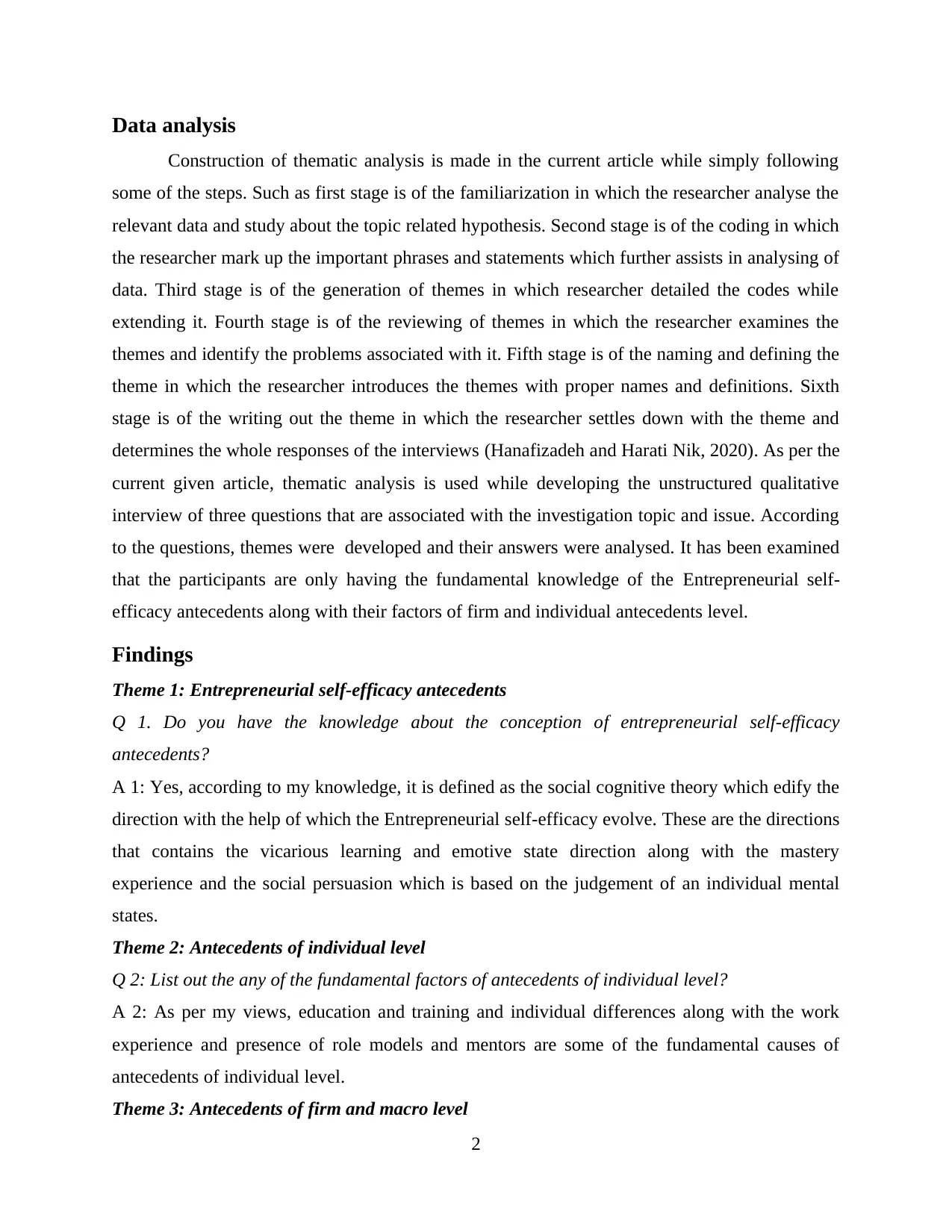
Data analysis
Construction of thematic analysis is made in the current article while simply following
some of the steps. Such as first stage is of the familiarization in which the researcher analyse the
relevant data and study about the topic related hypothesis. Second stage is of the coding in which
the researcher mark up the important phrases and statements which further assists in analysing of
data. Third stage is of the generation of themes in which researcher detailed the codes while
extending it. Fourth stage is of the reviewing of themes in which the researcher examines the
themes and identify the problems associated with it. Fifth stage is of the naming and defining the
theme in which the researcher introduces the themes with proper names and definitions. Sixth
stage is of the writing out the theme in which the researcher settles down with the theme and
determines the whole responses of the interviews (Hanafizadeh and Harati Nik, 2020). As per the
current given article, thematic analysis is used while developing the unstructured qualitative
interview of three questions that are associated with the investigation topic and issue. According
to the questions, themes were developed and their answers were analysed. It has been examined
that the participants are only having the fundamental knowledge of the Entrepreneurial self-
efficacy antecedents along with their factors of firm and individual antecedents level.
Findings
Theme 1: Entrepreneurial self-efficacy antecedents
Q 1. Do you have the knowledge about the conception of entrepreneurial self-efficacy
antecedents?
A 1: Yes, according to my knowledge, it is defined as the social cognitive theory which edify the
direction with the help of which the Entrepreneurial self-efficacy evolve. These are the directions
that contains the vicarious learning and emotive state direction along with the mastery
experience and the social persuasion which is based on the judgement of an individual mental
states.
Theme 2: Antecedents of individual level
Q 2: List out the any of the fundamental factors of antecedents of individual level?
A 2: As per my views, education and training and individual differences along with the work
experience and presence of role models and mentors are some of the fundamental causes of
antecedents of individual level.
Theme 3: Antecedents of firm and macro level
2
Construction of thematic analysis is made in the current article while simply following
some of the steps. Such as first stage is of the familiarization in which the researcher analyse the
relevant data and study about the topic related hypothesis. Second stage is of the coding in which
the researcher mark up the important phrases and statements which further assists in analysing of
data. Third stage is of the generation of themes in which researcher detailed the codes while
extending it. Fourth stage is of the reviewing of themes in which the researcher examines the
themes and identify the problems associated with it. Fifth stage is of the naming and defining the
theme in which the researcher introduces the themes with proper names and definitions. Sixth
stage is of the writing out the theme in which the researcher settles down with the theme and
determines the whole responses of the interviews (Hanafizadeh and Harati Nik, 2020). As per the
current given article, thematic analysis is used while developing the unstructured qualitative
interview of three questions that are associated with the investigation topic and issue. According
to the questions, themes were developed and their answers were analysed. It has been examined
that the participants are only having the fundamental knowledge of the Entrepreneurial self-
efficacy antecedents along with their factors of firm and individual antecedents level.
Findings
Theme 1: Entrepreneurial self-efficacy antecedents
Q 1. Do you have the knowledge about the conception of entrepreneurial self-efficacy
antecedents?
A 1: Yes, according to my knowledge, it is defined as the social cognitive theory which edify the
direction with the help of which the Entrepreneurial self-efficacy evolve. These are the directions
that contains the vicarious learning and emotive state direction along with the mastery
experience and the social persuasion which is based on the judgement of an individual mental
states.
Theme 2: Antecedents of individual level
Q 2: List out the any of the fundamental factors of antecedents of individual level?
A 2: As per my views, education and training and individual differences along with the work
experience and presence of role models and mentors are some of the fundamental causes of
antecedents of individual level.
Theme 3: Antecedents of firm and macro level
2
Paraphrase This Document
Need a fresh take? Get an instant paraphrase of this document with our AI Paraphraser
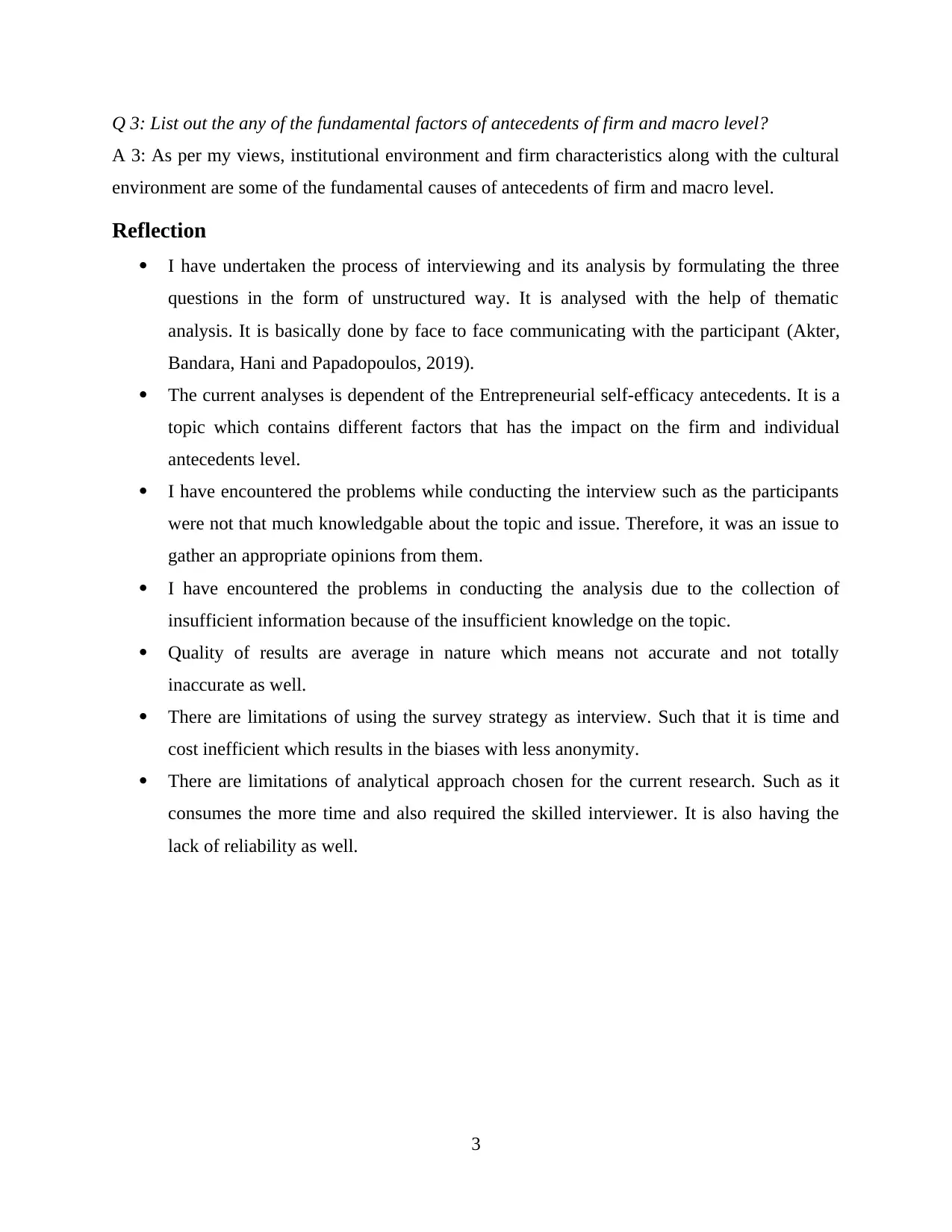
Q 3: List out the any of the fundamental factors of antecedents of firm and macro level?
A 3: As per my views, institutional environment and firm characteristics along with the cultural
environment are some of the fundamental causes of antecedents of firm and macro level.
Reflection
I have undertaken the process of interviewing and its analysis by formulating the three
questions in the form of unstructured way. It is analysed with the help of thematic
analysis. It is basically done by face to face communicating with the participant (Akter,
Bandara, Hani and Papadopoulos, 2019).
The current analyses is dependent of the Entrepreneurial self-efficacy antecedents. It is a
topic which contains different factors that has the impact on the firm and individual
antecedents level.
I have encountered the problems while conducting the interview such as the participants
were not that much knowledgable about the topic and issue. Therefore, it was an issue to
gather an appropriate opinions from them.
I have encountered the problems in conducting the analysis due to the collection of
insufficient information because of the insufficient knowledge on the topic.
Quality of results are average in nature which means not accurate and not totally
inaccurate as well.
There are limitations of using the survey strategy as interview. Such that it is time and
cost inefficient which results in the biases with less anonymity.
There are limitations of analytical approach chosen for the current research. Such as it
consumes the more time and also required the skilled interviewer. It is also having the
lack of reliability as well.
3
A 3: As per my views, institutional environment and firm characteristics along with the cultural
environment are some of the fundamental causes of antecedents of firm and macro level.
Reflection
I have undertaken the process of interviewing and its analysis by formulating the three
questions in the form of unstructured way. It is analysed with the help of thematic
analysis. It is basically done by face to face communicating with the participant (Akter,
Bandara, Hani and Papadopoulos, 2019).
The current analyses is dependent of the Entrepreneurial self-efficacy antecedents. It is a
topic which contains different factors that has the impact on the firm and individual
antecedents level.
I have encountered the problems while conducting the interview such as the participants
were not that much knowledgable about the topic and issue. Therefore, it was an issue to
gather an appropriate opinions from them.
I have encountered the problems in conducting the analysis due to the collection of
insufficient information because of the insufficient knowledge on the topic.
Quality of results are average in nature which means not accurate and not totally
inaccurate as well.
There are limitations of using the survey strategy as interview. Such that it is time and
cost inefficient which results in the biases with less anonymity.
There are limitations of analytical approach chosen for the current research. Such as it
consumes the more time and also required the skilled interviewer. It is also having the
lack of reliability as well.
3
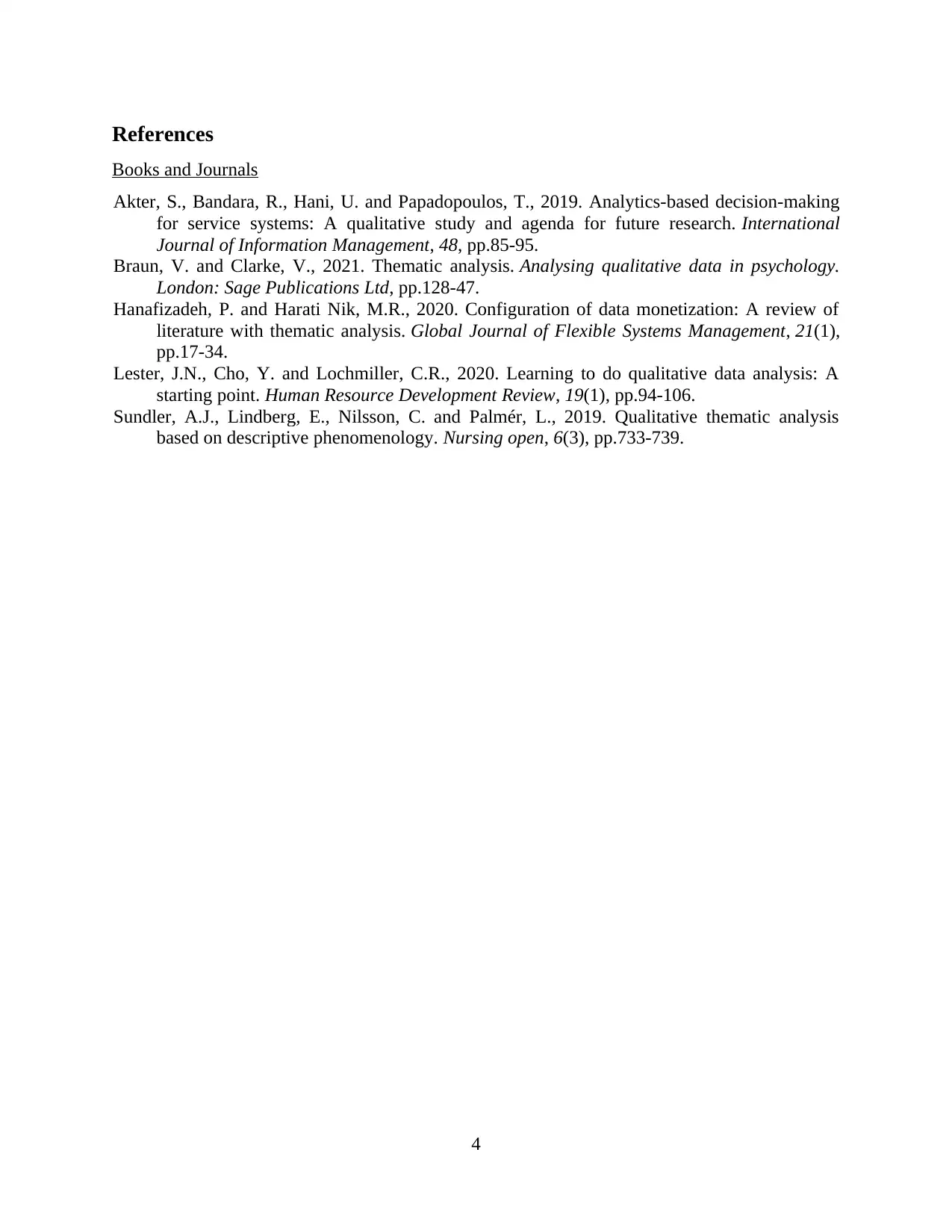
References
Books and Journals
Akter, S., Bandara, R., Hani, U. and Papadopoulos, T., 2019. Analytics-based decision-making
for service systems: A qualitative study and agenda for future research. International
Journal of Information Management, 48, pp.85-95.
Braun, V. and Clarke, V., 2021. Thematic analysis. Analysing qualitative data in psychology.
London: Sage Publications Ltd, pp.128-47.
Hanafizadeh, P. and Harati Nik, M.R., 2020. Configuration of data monetization: A review of
literature with thematic analysis. Global Journal of Flexible Systems Management, 21(1),
pp.17-34.
Lester, J.N., Cho, Y. and Lochmiller, C.R., 2020. Learning to do qualitative data analysis: A
starting point. Human Resource Development Review, 19(1), pp.94-106.
Sundler, A.J., Lindberg, E., Nilsson, C. and Palmér, L., 2019. Qualitative thematic analysis
based on descriptive phenomenology. Nursing open, 6(3), pp.733-739.
4
Books and Journals
Akter, S., Bandara, R., Hani, U. and Papadopoulos, T., 2019. Analytics-based decision-making
for service systems: A qualitative study and agenda for future research. International
Journal of Information Management, 48, pp.85-95.
Braun, V. and Clarke, V., 2021. Thematic analysis. Analysing qualitative data in psychology.
London: Sage Publications Ltd, pp.128-47.
Hanafizadeh, P. and Harati Nik, M.R., 2020. Configuration of data monetization: A review of
literature with thematic analysis. Global Journal of Flexible Systems Management, 21(1),
pp.17-34.
Lester, J.N., Cho, Y. and Lochmiller, C.R., 2020. Learning to do qualitative data analysis: A
starting point. Human Resource Development Review, 19(1), pp.94-106.
Sundler, A.J., Lindberg, E., Nilsson, C. and Palmér, L., 2019. Qualitative thematic analysis
based on descriptive phenomenology. Nursing open, 6(3), pp.733-739.
4
⊘ This is a preview!⊘
Do you want full access?
Subscribe today to unlock all pages.

Trusted by 1+ million students worldwide
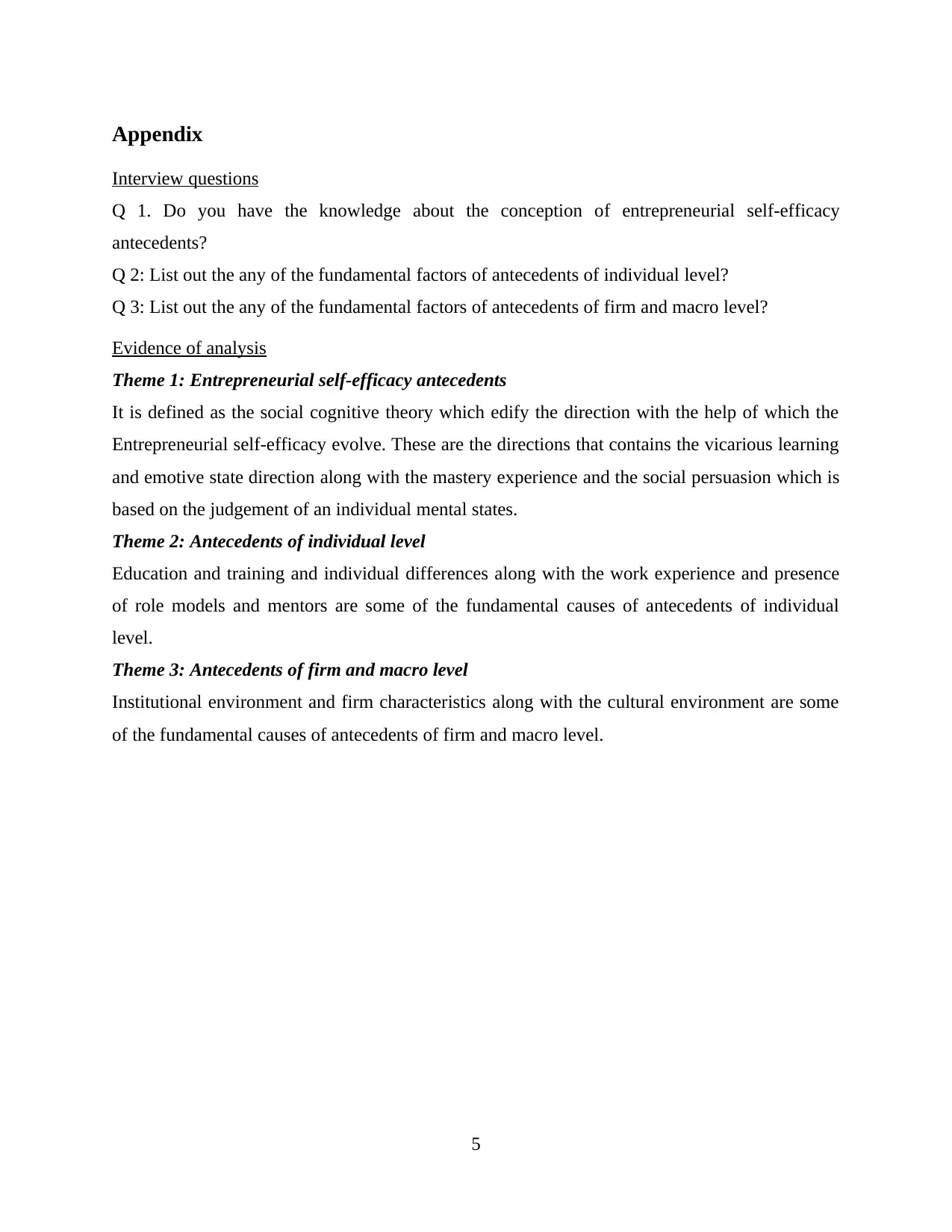
Appendix
Interview questions
Q 1. Do you have the knowledge about the conception of entrepreneurial self-efficacy
antecedents?
Q 2: List out the any of the fundamental factors of antecedents of individual level?
Q 3: List out the any of the fundamental factors of antecedents of firm and macro level?
Evidence of analysis
Theme 1: Entrepreneurial self-efficacy antecedents
It is defined as the social cognitive theory which edify the direction with the help of which the
Entrepreneurial self-efficacy evolve. These are the directions that contains the vicarious learning
and emotive state direction along with the mastery experience and the social persuasion which is
based on the judgement of an individual mental states.
Theme 2: Antecedents of individual level
Education and training and individual differences along with the work experience and presence
of role models and mentors are some of the fundamental causes of antecedents of individual
level.
Theme 3: Antecedents of firm and macro level
Institutional environment and firm characteristics along with the cultural environment are some
of the fundamental causes of antecedents of firm and macro level.
5
Interview questions
Q 1. Do you have the knowledge about the conception of entrepreneurial self-efficacy
antecedents?
Q 2: List out the any of the fundamental factors of antecedents of individual level?
Q 3: List out the any of the fundamental factors of antecedents of firm and macro level?
Evidence of analysis
Theme 1: Entrepreneurial self-efficacy antecedents
It is defined as the social cognitive theory which edify the direction with the help of which the
Entrepreneurial self-efficacy evolve. These are the directions that contains the vicarious learning
and emotive state direction along with the mastery experience and the social persuasion which is
based on the judgement of an individual mental states.
Theme 2: Antecedents of individual level
Education and training and individual differences along with the work experience and presence
of role models and mentors are some of the fundamental causes of antecedents of individual
level.
Theme 3: Antecedents of firm and macro level
Institutional environment and firm characteristics along with the cultural environment are some
of the fundamental causes of antecedents of firm and macro level.
5
1 out of 7
Related Documents
Your All-in-One AI-Powered Toolkit for Academic Success.
+13062052269
info@desklib.com
Available 24*7 on WhatsApp / Email
![[object Object]](/_next/static/media/star-bottom.7253800d.svg)
Unlock your academic potential
Copyright © 2020–2026 A2Z Services. All Rights Reserved. Developed and managed by ZUCOL.



